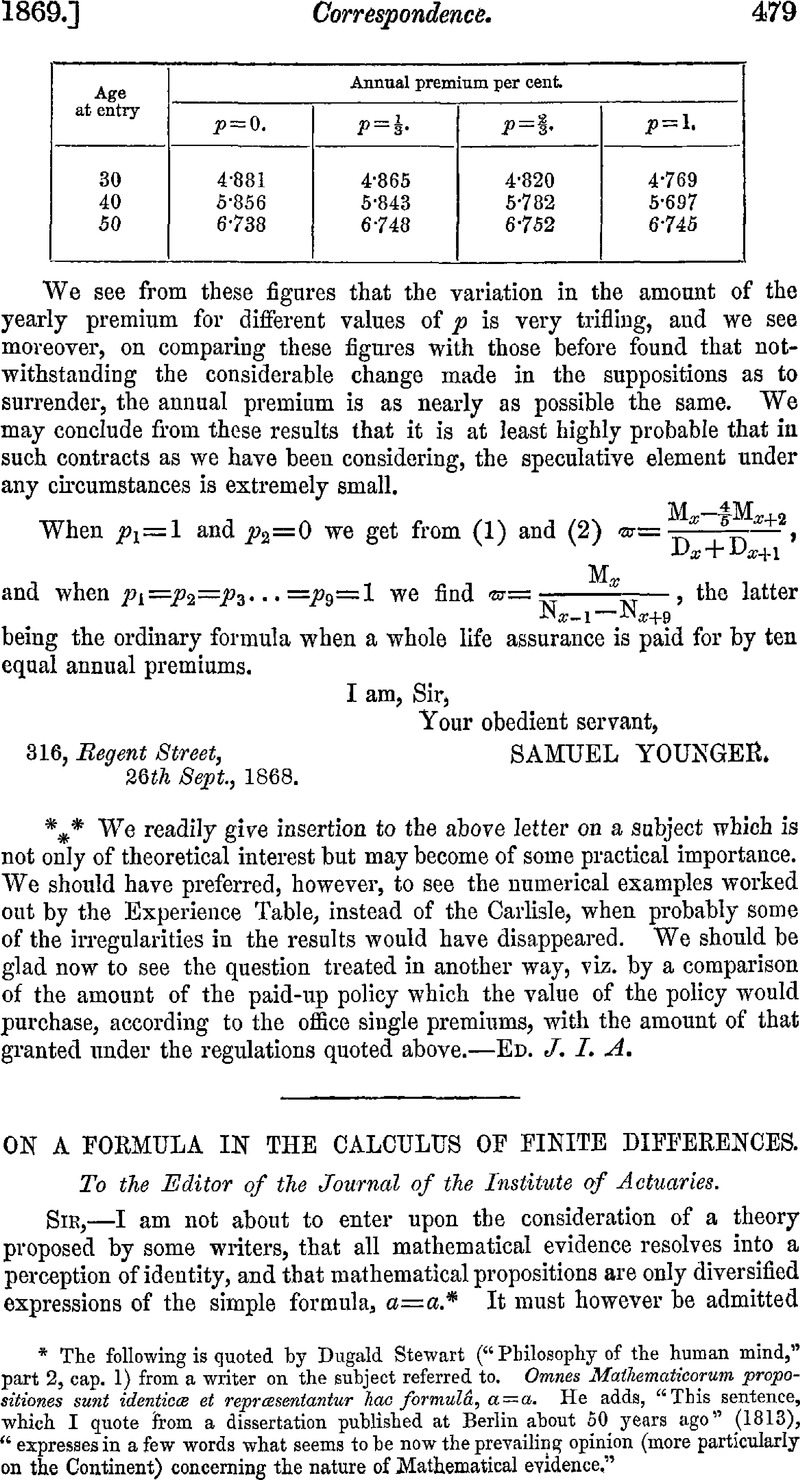No CrossRef data available.
Article contents
On a Formula in the Calculus of Finite Differences
Published online by Cambridge University Press: 18 August 2016
Abstract

Information
- Type
- Letter
- Information
- Copyright
- Copyright © Institute and Faculty of Actuaries 1869
References
page 479 note * The following is quoted by Dugald Stewart (“Philosophy of the human mind,” part 2, cap. 1) from a writer on the subject referred to. Omnes Matliematicorum propositiones sunt identical et reprussentantur hac formulâ, a = a. He adds, “This sentence, which I quote from a dissertation published at Berlin about 50 years ago” (1813), “expresses in a few words what seems to be now the prevailing opinion (more particularly on the Continent) concerning the nature of Mathematical evidence.”
page 480 note * The distinction I wish to point out between different kinds of equations may perhaps be put in a clearer light as follows. If in the equation, ux
= (1 + Δ)
xu
0, have been substituted the values of all the differences previous to Δ
xu
0 , as found by means of equation (2) from x terms of the series u
0, u
1, u
2, &c., the former equation is reduced to ![]() ; and to find Δ
xu
0 , the next, namely the x + 1th, term must be introduced. But this is ux
, the term on the first side of the equation. In other words, the previous terms of the series, and consequently the previous differences, are quite arbitrary in reference to ux
considered only as a given quantity, and which might be a term in an infinite number of series. But if ux
=fx , a known function of x, it is
; and to find Δ
xu
0 , the next, namely the x + 1th, term must be introduced. But this is ux
, the term on the first side of the equation. In other words, the previous terms of the series, and consequently the previous differences, are quite arbitrary in reference to ux
considered only as a given quantity, and which might be a term in an infinite number of series. But if ux
=fx , a known function of x, it is ![]() (Stirling's theorem), and since f0 and. all the differential coefficients f′0, fʺ0, fʺ0, &c., are determined if they are all finite, the value fx will be found. We must draw a distinction between using a formula containing given differences as an instrument to find unknown terms of a series, and deducing the relation between given terms of a series and their differences as shown in equations (1) and (2); and if the terms of the latter series follow some law, that will furnish a particular case of the general relation alluded to.
(Stirling's theorem), and since f0 and. all the differential coefficients f′0, fʺ0, fʺ0, &c., are determined if they are all finite, the value fx will be found. We must draw a distinction between using a formula containing given differences as an instrument to find unknown terms of a series, and deducing the relation between given terms of a series and their differences as shown in equations (1) and (2); and if the terms of the latter series follow some law, that will furnish a particular case of the general relation alluded to.
page 481 note * To show that this idea of the different modes of proof adopted by mathematical writers is not merely chimerical, I append the following remarks in reference to Dr. Wallis. “Sa façon de démontrer, qui est fondée sur induction plutôt que sur un raisonnement à la mode d'Archimède, fera quelque peine aux novices, qui veulent des syllogismes demonstratifs depuis le commencement jusqu'à la fin. Ce n'est pas que je ne l'approuyre, mais toutes ses propositions pouyant être démontrées viâ ordinariâ, legitimâ, et Archimedoeâ en heaucoup moins de paroles, que n'en contient son livre, je ne Scai pas pourquoi il a préféré cette manièr à l'ancienne, qui est plus convainquante et plus elegante ainsi que j'espère lui faire voir à mon premier loisir.” Lettre de M. de Fermat a M. le Chev. Kenelme Digby (Fermat's varia opera Mathematica, p. 191—as quoted by Dugald Stewart, “Philosophy of the human mind,” part 2, cap. 9).
page 482 note * The same results are also given by Dr. Farr, vol. ix., page 136, but in a different

